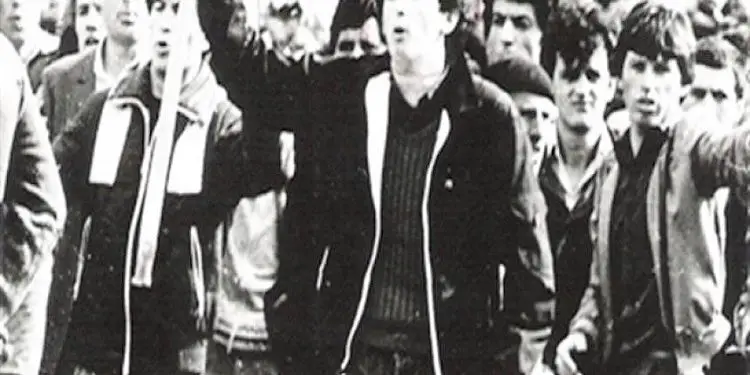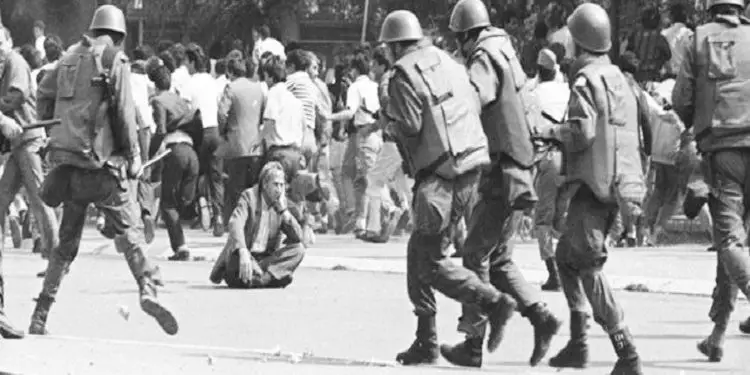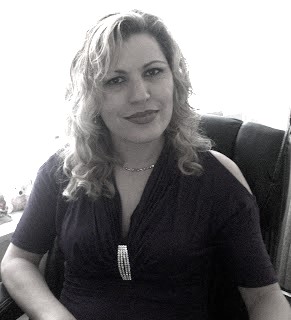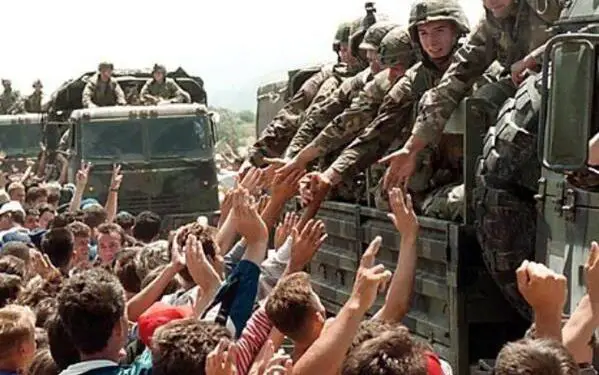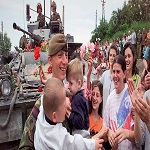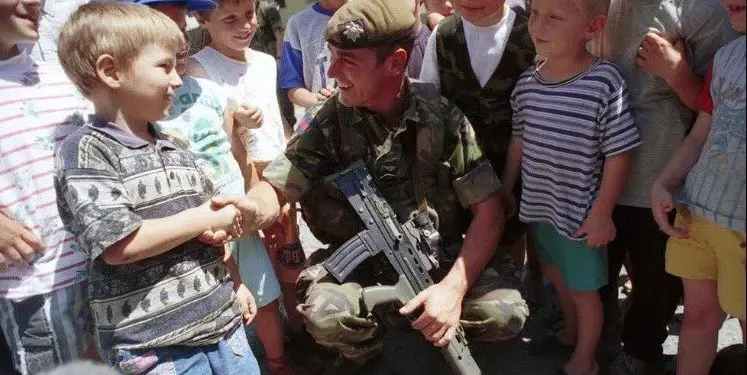From Keze Kozeta Zylo
Memorie.al / Makfire Maqedonci Canolli, an ethnic Albanian originally from Kosovo, where she was born and raised, immigrated with her family to several countries in Europe and finally to the USA due to the war in Kosovo, which was occupied by Milošević’s Serbian forces. She is a well-known poet and activist for the freedom and independence of Kosovo. In this exclusive interview, she shares the tragic history of her family, beginning from the time of Tito’s Yugoslavia, before the 1990s, when almost all members of her family were imprisoned and persecuted, to the year 1998 when she, along with her husband and two young daughters, were forced to leave their homeland due to the war in Kosovo, enduring numerous hardships in Germany and several other countries, before settling permanently in the USA, where they currently reside.
Mrs. Canolli, you have been in exile in America for years. How does Maki experience the departure from the Motherland, and what were the main reasons for leaving Kosovo?
In June, it will be 25 years since we arrived in America. Before that, we spent almost eight years in Germany, and leaving Kosovo for the second time, or going into exile, felt like a prisoner being returned to jail for a second time. Leaving my homeland has deeply wounded my soul. This is due to the fact that life in exile, far from my homeland, feels like the life of a child growing up away from its mother.
The main reasons for our departure from Kosovo for the first time in 1991 were because my husband had worked in the Kishnica and Strezovc mines, where he was a workers’ leader and a highly qualified mining technician. He was one of the organizers of the miners who protested and held a strike at that time, staying seven days and nights deep within the mine, in defense of the Constitution of Kosovo and those few rights we enjoyed at that time.
Serbia, after the end of those strikes, had issued arrest warrants, and after we held our wedding ceremony, my husband decided that we should leave Kosovo or otherwise he would have to surrender and serve a sentence, since he had been sentenced in absentia. However, the German authorities, even though we had documents and evidence, never believed our request for asylum there during that time. Even though our two daughters were born there and we stayed for nearly eight years, working as we had the right to work and were not dependent on the state, we still did not gain the right to permanent residency.
The German authorities had signed an agreement with Milošević for the return of Kosovo Albanians, under which Serbia received a sum of money from Germany, having “guaranteed” that no harm would come to the Albanians from Kosovo. Germany began to deport Kosovars, arguing that supposedly there was no danger for them in Yugoslavia! Thus, games were being played with our lives!
The truth was that in Kosovo, the war for liberation had begun. Two days after we returned in February of that year, the first massacre occurred in the Drenica region. Then, we remained throughout the entire war in Kosovo, precisely in our hometown of Prishtina. We were later forced, like thousands of Kosovars, to leave our homes and flee from our motherland!
What is your family’s contribution during the war in Kosovo against Serbia and some of the most difficult and painful moments of your life in Kosovo?
The contribution of my family for the good of the national cause has never been lacking. My family has always been targeted by the Yugoslav UDB (the secret police), and this was evident when, in the spring of 1982, three of my brothers were imprisoned, along with hundreds of “illegal” comrades, after their “hostile” activities, as Serbia referred to them, were discovered! They were sentenced to imprisonment for 14, 6, and 5 years, spending the most beautiful years of their youth in Serbian and Slovenian prisons! Two cousins were also imprisoned, enduring their sentences.
Unfortunately, I have experienced far more bitter and painful moments than joyful ones back in my homeland, and these have left wounds in my soul and marks in my mind! The fact is that life hit me many times, like the waves of the sea, since childhood, when I still needed toys like my peers; I had to play the role of an adult because when my three brothers were imprisoned, I was only 11 years old. After a year, our mother became fully paralyzed, even though she was still quite young at just 48 years old; she could not withstand the pain she felt every time she visited her sons in those prisons, realizing that they were subjected to inhumane torture!
Then, as painful as it was, it was also tragic when she passed away after several months in illness, at the age of 49, and was buried without the presence of her sons, as they did not have the right to leave the prison, even just to say goodbye to their mother for the last time. A sorrowful moment was when we visited our brothers in those prisons, and they awaited good news hoping that their mother would get better. We had to tell them that she had passed away a few days or weeks prior. Then came the further horrors of the following years, where every second and minute we were shadowed by the UDB, regardless of even the smallest movement of ours, whether we were adults or children!
During the war, we also experienced difficult and painful moments because when we returned from Germany, there was a state of war. We had not seen my family and friends for almost eight years, and we found them in a very dire situation, psychologically, emotionally, and economically! We tried to help them as much as we could, with clothes or food, especially those residents of areas where the war had reached significant proportions, but it was impossible to help everyone.
It is impossible to recount everything here, but the peak of all the evils I experienced since childhood was the saddest moment of my life when the police and Serbian paramilitaries came, wearing headscarves and painted faces, and three tanks stood in front of my father’s house. Inside, besides our family, there were many other people from the Drenica region and other areas whom my brothers had taken in, offering them shelter. Under the barrels of automatic rifles, we were forced to leave our homes, being cursed for seeking help from America and NATO, and threatened that they would kill us, and we began to walk without knowing where we were being taken or what would happen to us.
After many hours of walking, we saw elderly and sick people on the road that could not walk, while no one was allowed to help them or even look back at them, not even your parent, because they would kill you! It was an endless column of people, and it was said that everyone would be taken to the football stadium, where they would execute us all! But when we passed the stadium, we realized we still had to keep going, and they finally stopped us at the train station in Prishtina.
It was around 8 p.m., and after gathering us there, we began to sit on the ground because we were exhausted and overwhelmed. They started to insult us and said; 50 of us should stand up, and we were convinced that there, they would execute us. When I saw my brothers standing up among the first, I, along with my husband, stood up too, and I said; I don’t want to live another minute. Donjeta was 6 years old, while Dalina was 16 months old.
I had looked at both of them and written down the phone number of my older brother, who was in Germany, for Donjeta. I told her: ‘My dear, here is your uncle’s number, and if they kill us and you escape, do not forget wherever you are, try to find your uncle and remember, I love you very much.’ I kissed her with tears in my eyes and put her behind me!
Dalina had fallen asleep; she was in the children’s stroller. I looked at her and placed her in front of me, saying: ‘Forgive me, my soul; it’s not that mommy loves you less, but it’s better to kill me than to let you fall into their hands!’ Fortunately, at that moment, when they wanted to take us away and separate us from the crowd, the NATO airplanes could be heard, and they started shouting at us loudly; ‘Lie down on the ground!’
After more than half an hour of staying in that position, when they felt the danger from the NATO planes had passed, they told us to get on buses and trains and began separating people, sending some one way and others another. They forced us onto one bus, where we were piled on top of one another, to the point that I don’t believe a needle would fit. The doors and windows were closed, making it difficult to even breathe. Women and children were crying; some had hurt their arms or legs and couldn’t turn or move at all. We were held there until 9 a.m., with anxiety, waiting for any moment when they would throw us in the air with a bomb!
Then we set off for Macedonia, which we realized when we arrived at a place called Bllacë, where many Albanians found death. But fortunately for us, since there was no room for us, they directed us to the other side of the border, where, after getting off the bus and trying to cross the border, the terror and torture began from the Slavic-Macedonian police and army, who not only greeted us with insults and abuse but also drove into the midst of that large crowd with a bus, wishing to crush us all. I don’t even know how we escaped alive!
After many hours of waiting and hardships, we crossed the border, where we were welcomed by our Albanian brothers from that region, who took us into their homes! However, we had to take Dalina immediately to the hospital, as she was dehydrated and in a serious health condition! After a few weeks, we ended up in the Stankovec camp, where we stayed for several weeks and registered with all the states, but it was America that first took us under its protection, and we came across the ocean where we are today!
I am amazed by your use of the beautiful Albanian language, considering you were under Serbian terror. How did you survive with the language, traditions, and culture?
Preserving our traditions and preserving the language was undoubtedly not easy for us, but it was love for our homeland that kept us alive! The fact is that we were in danger from the Slavic language, just as we were from the Turkish language. I, for my part, do not even know the Serbian language today because I mentioned that I was young when my brothers were imprisoned, and that was the main reason why I hated the Serbian language. From that moment on, I never tried to learn it.
Even though my mother insisted that I learn it, telling me that it’s good to know every language, especially one from which you could face provocations in life! We were forced in school to learn the Serbian language, two times a week for one hour, but I always struggled in that subject and barely passed because I never wanted to speak the language of my family’s enemy and of my nation in general!
Your daughters, Donjeta and Dalina, have been recognized as exemplary students, with Donjeta being congratulated twice by President Bush and Dalina twice by President Obama as outstanding students. How have they achieved this success?
My daughters have always stood out as excellent students in their studies and in the school orchestra, where they were distinguished instrumentalists playing the violin. As a result of their success, both have been awarded diplomas by the Presidents of the United States! Donjeta was honored twice by President Bush, and Dalina was also honored twice by President Obama!
Undoubtedly, they achieved these successes through hard work and dedication, but parental support has never been lacking. Above all, it has been their will and desire to reach the heights of success, and we hope they continue in the same way in the future! Last year, Donjeta graduated from university in London with a degree in law and is now planning to continue her studies for a master’s degree, while Dalina, after finishing high school last year, has continued her studies at Hartwick College & University in Oneonta, New York, pursuing a degree in medicine!
Your creations often revolve around themes of patriotism, nationalism, and the struggle for freedom in Kosovo. Have you experienced these, and do you find more inspiration in this or elsewhere? When did you start writing for the first time?
Most of my creations deal with patriotism and our struggle, as well as love for the homeland, but I also have other works, whether about love, life, and dedicated to my daughters, or other themes. The patriotic spirit has certainly influenced me, as I was born and raised in an environment that was always imbued with nationalism! However, Mother Albania has always been my dream since childhood, like for every Kosovar, and that dream still exists today.
On one hand, I am very far from her physically today, but spiritually I always have her close, and secondly, we still dream of unification with Mother Albania! I started writing poetry for the first time in the second grade at “Emin Duraku” primary school in Prishtina, and it was precisely my teacher, Zejnije Syla, who discovered my talent!
In your poetry, the soul of a poet burns for the vision of a united nation. Do you hope that this will be achieved one day?
The heart and soul weep for this desire or sorrow that I often express through verses, and I certainly hope that one day it will become a reality! Our unification will be achieved when all Albanians, in Kosovo, Albania, and other territories, hold such a desire in their hearts, and when we all join forces and work with flesh and spirit for the realization of this century-old dream and for the good of our national cause! If the Germans achieved their goal and brought down the Berlin Wall, why shouldn’t we have the right to achieve the same? We are still divided worse than they were, as they had Germany divided into two parts, while we Albanians have our homeland divided into six parts!
Of course, we should not expect those who divided us to unite us, but we must strive ourselves for unity. This will undoubtedly require new efforts and sacrifices, but I believe it is not an unattainable goal. It should be that at the head of the state, in all our institutions, from the presidency onward, there are people who carry the national interests in their hearts and minds, not personal ones! With the people currently in power, I naturally do not expect such a thing to happen. I am speaking primarily about the politicians in Kosovo!
You host the program “The Heroism of the People through the Centuries” on the “Voice of the Diaspora” radio. How do you base your material, and do you think historians should reexamine many things?
I have collaborated with Radio “Diaspora,” based in Sweden, on the internet waves, and I have hosted the program “The Heroism of Our People Throughout the Centuries,” where we mainly showcase the biographies, lives, and works of freedom fighters, martyrs of the Nation and Homeland, such as Adem Jashari and his family, as well as Zahir Pajaziti, Tahir Sinani, Skerdilajd Llagami, and many other martyrs.
I have secured materials from various books dedicated to these individuals, but naturally, there is still much to be written in that direction. Our historians need to revisit many things, but they must also strive to ensure that our history is written as it has been experienced, and not as others want to write it for us!
We wish you great success and a prosperous year, honored Maki.
Thank you very much, sister Kozeta, for the time you have given me and the space you created for me, as well as for the invitation to this interview. Thank you for making me part of your many interviews with patriotic individuals, artists, musicians, scientists, politicians, and people from various fields. I also wish you prosperity and success in every sphere of life, and I commend you for your tireless work as you are always in service of our community, especially across the ocean, keeping the Albanian spirit alive, whether through the television “Alba Life” or through the Albanian School and your numerous activities!/Memorie.al




